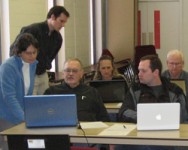Event Details
Date
March 16, 2015
Time
1:00 PM - 4:00 PM
Location
CCE Niagara County
4487 Lake Avenue
Lockport, NY 14094
Cost
This event is free.
Host
Cornell Vegetable ProgramCarol MacNeil
585-394-3977 x406
email Carol MacNeil
CANCELLED: Forecasting Late Blight Risk: Using An Online Tool to Make Decisions for YOUR Farm
March 16, 2015
THIS EVENT IS CANCELLED DUE TO LOW REGISTRATION NUMBERS. Interested growers are encouraged to attend the March 20 training in Geneva or via webinar.
The Cornell Vegetable Program and NYS IPM will assist growers with setting up an account on the Late Blight (LB) Decision Support System (DSS) website. Learn how late blight (development) units, and fungicide (loss) units, are used to forecast when you'll need to apply a fungicide spray to YOUR farm location/fields. Get text alerts or a personal email when you are within several days of needing to spray.
This system uses both weather station data, and National Weather Service forecasts for your farm. The residual activity of the specific fungicides you input is taken into account. (The DSS works with copper fungicides, for organic production.)
Finally, learn how you can get your own farm weather station for more accurate forecasts.
DEC and CCA credits will be available if you haven't taken the class before.
FREE but preregistration required by Wednesday, March 11, 2015. Contact Carol MacNeil (or 585-394-3977 x406) with your name, email address, phone number, and town.
Bring a wireless internet-capable laptop, or ask for a loaner in advance. (A smart phone or tablet can be used once you've set up your account.)
This event is also being offered at the NYS Ag Experiment Station on March 20, 2015
Or you can sign up for a live webinar to be held on March 20, 2015. (No DEC credits are available for webinar participants.) Contact Carol MacNeil to sign up for the webinar. Space is limited, with preference given to NYS growers or consultants who have not taken the class in the past.



































